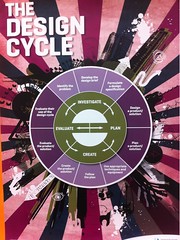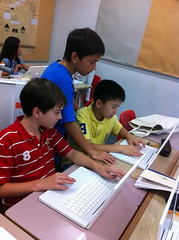Once again international school recruitment time is here. Jobs are being posted at schools around the world (including YIS) and people are already talking about new adventures on the horizon. To be honest, even if I’m staying at the same school, this is my favorite time of year. I love imagining the possibilities of a new school, a new home and a new country – not just for me, but for anyone trying something new. It’s definitely a topic I never get tired of talking about!

One thing I didn’t truly understand until this year is just how important it is to find the right fit – for you and the school. I think I’ve been pretty lucky to work at 4 excellent schools, in 4 fantastic cities. But I don’t think I really made an effort to find exactly the right school for me until this past year, when Alex and I interviewed here at YIS. In the past I was lucky to end up at good schools, this time around I looked for some very specific attributes that I knew were important to me – and I was very honest with the YIS admin team when I was interviewing. As much as I love new adventures, it’s no fun to feel like you “have” to leave a place because it didn’t turn out to be what you expected – or because you didn’t turn out to be who the school expected you to be.
So, in the last ten years of teaching in international schools, I think I’ve finally discovered what the key attributes of a school are (at least for me). For those of you interested in making the move to an international school, hopefully these criteria might help you make the right choice!
Size
There is a big difference between a “big” school and a “small” school, and I don’t think I realized just how big of a difference until I worked at ISB (with around 1800 students) after working at MKIS (around 700 students) and MIS (around 11oo students when I left), and now YIS (around 700 students).
Each have their advantages: Small schools have a community feeling, everyone knows each other, it’s easy to make connections between classrooms, to catch up with teachers face-to-face, to explore opportunities outside your specific job title, and to have a direct impact on the schools’ future. Big schools have tons of resources, lots of unique positions (I think there are now 5 different coaching positions at ISB), and good connections to other international schools. And, of course, they also have their disadvantages: Small schools are not as well resourced, teachers usually end up teaching in multiple divisions instead of being able to specialize in one subject or grade level, and sometimes the infrastructure is not quite there. Big schools can be impersonal, it’s hard to get to know so many teachers and students, you can get pigeon-holed in your specific area of expertise, and often don’t have much say in the direction of the school.
For me, I think I prefer a smaller school – I like the feeling of knowing your colleagues and all of the students, of being able to actually help shape the future of a school, and contribute in a number of areas – without feeling like a cog in the machine. If you discover you like one size better than another, it’s an easy way to filter out prospective job opportunities.
Curriculum

Even though international schools are in pretty much every city in the world, they usually follow only a few different types of curriculum: British, Australian, US, Canadian or IB (PYP, MYP, DP). Having been trained as a teacher in the US, I’ve only actually worked in one school that has a very North American curriculum, all of my other schools were IB World Schools. Although it seems that most of the larger, more established schools run a North American curriculum (and so many have “American” in the name), I’ve found that I really prefer the holistic, integrated approach of the PYP & MYP curriculum models.
Considering the curriculum is something you deal with every single day in every single class, it’s an important facet of a school to consider. It’s easy to be “wowed” by recruitment videos and presentations at the fairs, but the curriculum is what really demonstrates a school’s educational approach, philosophy and values. If yours don’t align, it might make for a difficult match later down the line.
Location
The location of a potential job offer might not always be something we can make a priority, but it’s certainly something to consider. It can be better to work in a well-established, board-run school in a challenging country, than to be working in a for-profit, questionable school in a stable country. Of course, in addition to the type of school and the country, there’s also the location of the school within the city. I’ve worked in both rural locations & urban locations and for me, I certainly prefer to be in the city if I can. A school on the outskirts of a city often has more resources – bigger buildings, beautiful grounds, great sporting facilities, but the commute (or living in the middle of nowhere) can turn those advantages into a disadvantage. A school in the middle of the city could be cramped, always strapped for space, and noisy, but the easy access to city living and convenient transportation can make up for a lot.
Technology

Obviously, technology is pretty important to me (although it might not be for other teachers). Even if you’re not a tech geek like me, there are a few things that always stand out to me when investigating future schools.
One is how the technology department views the use of technology in the classroom – are teachers given admin rights over their own computer, how many and what type of websites are blocked at school, what kind of access do students have to technology (can they bring their own devices and get on the school network), and what is the department (and the school’s) vision for technology? There are still many international schools that have a philosophy of control rather than support and collaboration.
Another is the school’s interest in (or implementation of) 1:1. I had a great conversation with a fellow new teacher at YIS this year and she said she would never choose to work in a non-1:1 school again (and she’s not in the EdTech field). In fact it was one of her main criteria for her next school, and YIS only scraped by because of their commitment to moving in that direction next school year. More and more, 1:1 will be a deciding factor both for teachers, and for recruiters looking for teachers experienced in this kind of environment.
And then of course, there’s the Mac vs. PC debate. We all know where I stand, and I must admit, it’s a big factor in my recruitment practices. In both PC schools that I’ve worked at, I’ve spent a much greater percentage of time trouble shooting the technology rather than teaching. It’s not something I really want to be spending my time doing – that’s why I’m a teacher and not a technician. I said when I left Munich (which was PC at the time, but has since gone 1:1 Apple) that I would never work in a PC school again. The only reason I accepted the position at ISB (then a dual-platform school) was because the ES was Mac (and the whole school is now moving towards 1:1 Apple). Needless to say, I’m thrilled to be back in an all-Mac environment, here at YIS.
You might be coming at this debate from the exact opposite perspective, but either way, it’s a good thing to consider before you sign a contract. If you’re not comfortable working with one platform, and that’s the one the school has chosen, you need to be prepared to spend some time learning that new operating system. Because this is often one of the last things that teachers think about when recruiting, it can also be one of the most frustrating when arriving at a new school.
Student Body
It sounds funny, since we’re talking about “international schools” but another important facet to consider is the student make-up. How diverse is the school population? Is there a common language among all students? How long do families usually stay at the school?
I’ve been fortunate to work at a few schools where there really is no dominant nationality or language and it makes a difference – those schools feel truly international. Students aren’t judged by their culture or communication abilities, and everyone is included in conversations because they take place in English, the language of instruction. I’ve also worked in schools with a very high percentage of local students, which often leads to a feeling of (false) “superiority” by the local students and for some of the truly international students to feel left out.
This is more than just numbers – many families hold multiple passports and will be considered international even if they have never left the host country. Being a truly international school is a feeling – acceptance among students of cultural differences, hearing multiple languages in the hallway, open discussions about difficult issues, and respect for both students and teachers. It’s tough to determine if a school is truly international sitting in a hotel room at the job fair, but if you get a chance to visit a prospective school, you can usually get a feeling for it right away.
Final Thoughts

Of course, these are only a few of the things to consider when moving to a new school, they just happen to be the items that are high on my priority list. And, to be honest, I feel amazingly lucky to have found a school that actually meets all of my criteria. Not only does it feel great to be in a school that matches my philosophy of education and beliefs about learning, but it feels even better to know that I’m bringing to the table exactly what the school is looking for. It’s the kind of match that I feel lucky to have made in the past (not every time, of course), and now I’m starting to have a better understanding of how to make it happen.
And, since it is recruitment time, and I do think YIS is so fantastic, I sure hope some of you might consider applying for a job here! Our final list of vacancies won’t be posted until after the Bangkok recruitment fairs (around Jan 10th), but keep checking back for updates. We are a small school, but we’re moving ahead at lightening speed, have a fantastic and positive staff, with great supportive administrators. I couldn’t be happier.
If you’re looking for a new job this year (or have found just the right one in the past), what aspects of a school do you consider and value? Have I left anything off the list?
Images
- Piece by Piece on Flickr by Darwin Bell
- MYP Design Cycle from IBO Shop
- Helping on Flickr by superkimbo
- Checklist on Flickr by alancleaver_2000





Kim
Thats great to hear you prefer smaller schools. I feel the same way. I love the community feel to it all. Theres not alot of red tape to get through. I guess one of the ‘bad’ things about good small schools is the limited opportunities for advancement. No one wants to leave! This is my second year in Bandung, Indonesia and we have made huge steps on tight budgets. The whole community is better for it too. Good luck in Japan!
Jay Graham
Well written Kim!
Forgot the .com at the end of my blogsite :-(
Jim Doran´s last blog post ..Coming Home
Kim,
love your post, I will pass it on to others and am seriously considering applying! Need to convince the family as well. You are a real ambassador for intnl. schools in general
tcomfort´s last blog post ..David Warlick on xtranormal
This is a very helpful post Kim, especially for people considering teaching OS for the first time.
I would add one more thing to the list – the make-up of staff nationalities is also important and I think having a good mix of staff from a range of countries and systems helps contribute to a genuinely “international” feel.
Cin Barnsley´s last blog post ..Portal to Media Literacy
Kim:
Thank you so much for this post — I will be attending an upcoming OS job fair in Iowa for the first time in February. Your list is very helpful and included some things that I may not have thought of. Much appreciated.
Hi, Kim. I’m with you on all those points. They’re exactly the ones I’ll be considering when I leave this position. I do have one more point in the tech area: I never want to work in a country again where there is internet blocking. After 10 years in China, I am dreaming of life beyond the Great Firewall. That may be my number 1 consideration for next time.
Josianne´s last blog post ..Belated Birthday Book Club!